Support strong Canadian climate journalism for 2025
Conservative MP and leadership contender Maxime Bernier says he will soon consult with scientists about the environmental policies in his platform.
But he isn't quite ready to admit he'll listen to what they say.
"I think it’s important to note that the climate is changing," he told National Observer at the Conservative Convention in Vancouver last week. "I want to have policies that will be based on science. If the science is right, I think we must do something.”
The representative for Beauce, Que. has never denied that the planet is getting hotter, but he's among a small group of Conservatives who have openly cast doubts about scientific evidence that has long demonstrated humans are to blame for most of the global warming observed in the last century.
"I am not a scientist and I will have to do the consultation," Bernier said. "I know there are scientists who think that the climate is changing and it’s because of humans. We’ll have to look at it and take a position at the right time.”
His fresh take on the global threat comes only weeks after launching his Conservative leadership bid under the pillars of freedom, personal responsibility, fairness, and respect. Though far from firm or proactive, Bernier's latest musings about climate change contrast from his denial of the problem in 2010, when he made national headlines for applauding the Harper government's slow, cautious approach to tackling Canada's rising carbon footprint.
Other contenders in the Tory leadership race so far include Wellington-Halton Hills MP Michael Chong and Simcoe-Grey MP Kellie Leitch. Anticipated contenders who have not yet tossed their hat into the ring include Jason Kenney, MP for Calgary-Midnapore and a former national defence minister, Peter MacKay, a former Nova Scotia MP and veteran Cabinet minister, Milton MP Lisa Raitt, and possibly ex-Dragon's Den star, Kevin O'Leary.
WATCH: Bernier's comments on climate change
Elizabeth May not buying it
“Every week that goes by confirms the wisdom of our government’s modest position,” Bernier wrote in a 2010 letter published by Montreal’s La Presse newspaper.
“There is, in fact, no scientific consensus. What’s certain is that it would be irresponsible to spend billions of dollars to impose unnecessary stringent regulations to resolve a problem whose gravity we are still not certain about. The alarmism that often characterized this issue is no longer at stake. Canada is right to be cautious.”
At the time, Bernier's skepticism earned him a scathing review from Green Party leader Elizabeth May, who pointed out that his views were consistent with his climate-denying Tory boss. She also rhymed off a list of Bernier's credentials — including leadership of the Montreal Economic Institute, which has opposed science from the Intergovernmental Panel on Climate Change — as part of the Quebec MP's "long history" of climate denial.
Based on what he told National Observer, May also said on Thursday she would be "very surprised" if Bernier had indeed, changed his stance on the topic.
"Unless he says burning fossil fuels is changing the climate, did he say that?" she said over the phone from Ottawa. "He said the climate is changing and there should be science — that could cover for (him suggesting climate change is caused by) sunspots and other loony theories. He’s been very strongly opposed to climate action for so long that unless he’s willing to say something he doesn’t believe in order to win the Conservative leadership, I’d be very surprised."
In essence, she'll believe it when she sees it.
Bernier has yet to launch his environmental platform and said he would do so in the fall after consultation. He remained tightlipped during the interview on his thoughts about carbon pricing, but he eagerly voiced his support for new interprovincial pipelines.
Disappointed with Trudeau government
As far as Bernier is concerned, pipeline discussion in Canada should not revolve around whether or not to build them, but how they can be built as quickly as possible in consultation with Canadians, including Indigenous people. Prime Minister Justin Trudeau — whose government has waffled on pipeline support since the election — has not taken enough leadership on this topic, he argued.
"That’s his job to explain to Canadians why it would be good for the economy and the environment, and he’s not doing that right now," said the former Cabinet minister, who was a star of the Harper government until 2008, when he resigned after leaving secret documents in the apartment of his then-girlfriend, who had links to the notorious Hells Angels.
“If we want to create wealth and jobs in this country, it is not by government spending, it is by entrepreneur investing," he added. "The economic policy will be based on that and that will create wealth and jobs in this country, and we’ll be able to do more reform.”
Pipelines are a great way to stimulate the economy with cash from the private sector, he explained, without using public funds or borrowing money the government doesn't have. The Conservative leadership election isn't until May 2017, but if elected as prime minister in 2019, Bernier said his goal would be to balance the federal budget within two years.
The Tory MP said his economic platform would include support for foreign investment, lower taxes to small businesses and Canadians, and the possibility of more free trade agreements. Bernier has previously served as Minister of Industry, Minister of Foreign Affairs and Minister of State for Small Business and Tourism.
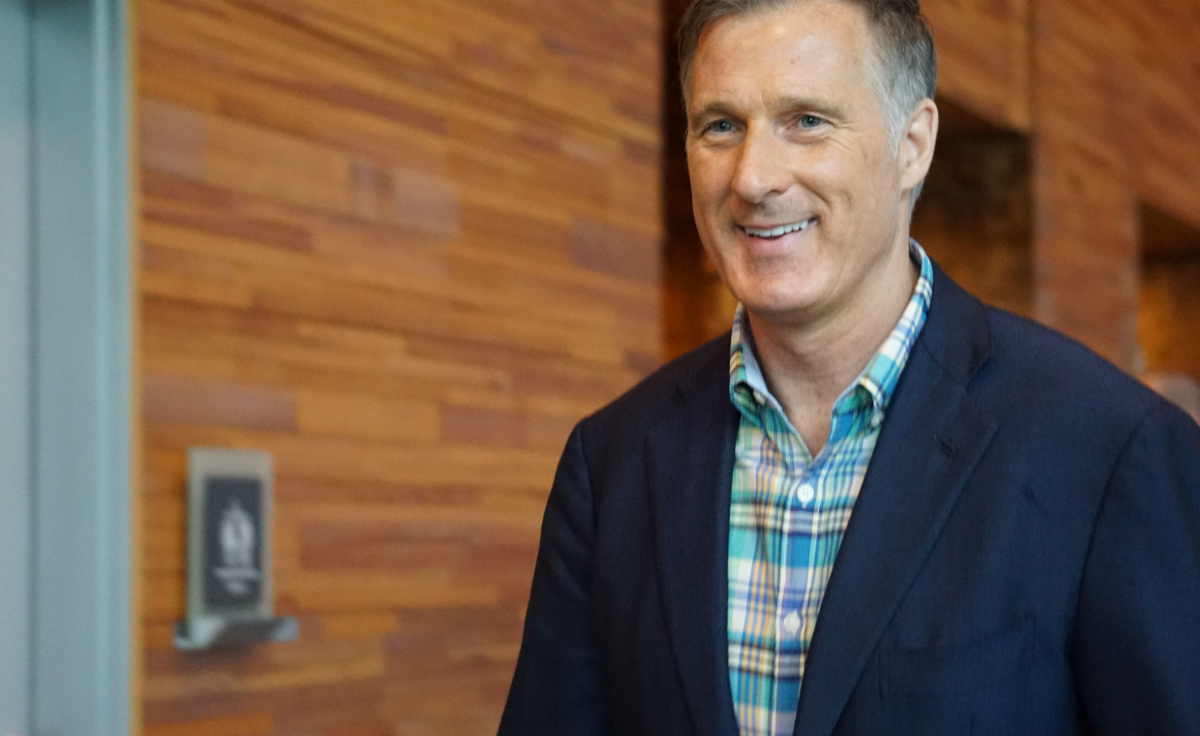
Where the Harper government went wrong
Unlike Conservative MP for Wellington-Halton Hills Michael Chong — one of two opponents in the race so far, who admittedly prefers not to "dwell on the past" — Bernier also had no hesitation to talk about how he would improve the party after ousted prime minister Stephen Harper.
Under the former Tory leader, he said, many reforms were passed in the form of large monster omnibus bills, a mistake he would not repeat.
“I think next time we have a reform in mind, we must have time to debate using the members of Parliament and the committees of the House," he explained. “I think like that, we have the best ideas and I think we have the best solutions. So we have to be proud of that and speak about that openly with Canadians, and it will be easy to implement our reform."
Like Chong however, his ambitions for the party include expanding its support to include the majority of Canadians rather than whatever smaller number may be required to win. It comes down once again, he said, to his core principles of freedom, personal responsibility, and fairness.
"I want Canadians that are not members of our party to become members, and that’s a challenge," he told National Observer. “The discussion must be open to all Canadians. I think being a Conservative and believing in freedom — that’s fair for people.”
Bernier also plans to part with the party's longstanding support for a supply-managed agriculture sector in Canada, which he finds "inefficient, "fundamentally unfair," and the "opposite of free markets," the CBC reported on Tuesday. The supply management system sets quotas and trade tariffs that are meant to control prices of agricultural products for the benefit of farmers.
Bernier, the libertarian?
The veteran MP — involved in politics for roughly a decade — has long been thought of as a Libertarian, and at times, has promoted himself as one, but in speaking with National Observer, clarified that many of his values differ from the political philosophy based on freedom. For example, he supports Canada's involvement with the United Nations, NATO, and other international organizations.
“I’m a Conservative who believes in freedom — that’s important — and personal responsibility," he explained. "Libertarians — they believe in freedom also, but they don’t see the role of the government at the international scene in different conflicts. I don't agree with that.”
Bernier hopes in the upcoming election he will be judged based on his policies, and named former prime minister of the United Kingdom Margaret Thatcher as a major inspiration. She ran her Conservative party and her country based on unwavering principles, he explained, and he hopes to do so as well.
“Im my team I’m very proud and very happy we have people who call themselves social Conservatives, who call themselves fiscal Conservatives, we have people who call themselves libertarian," he said. "That’s because I’m speaking about individual freedom and personal responsibility. Those are the bases of Western civilization."
Bernier plans to engage the public with one new policy discussion every month until the 2017 Conservative Party election.

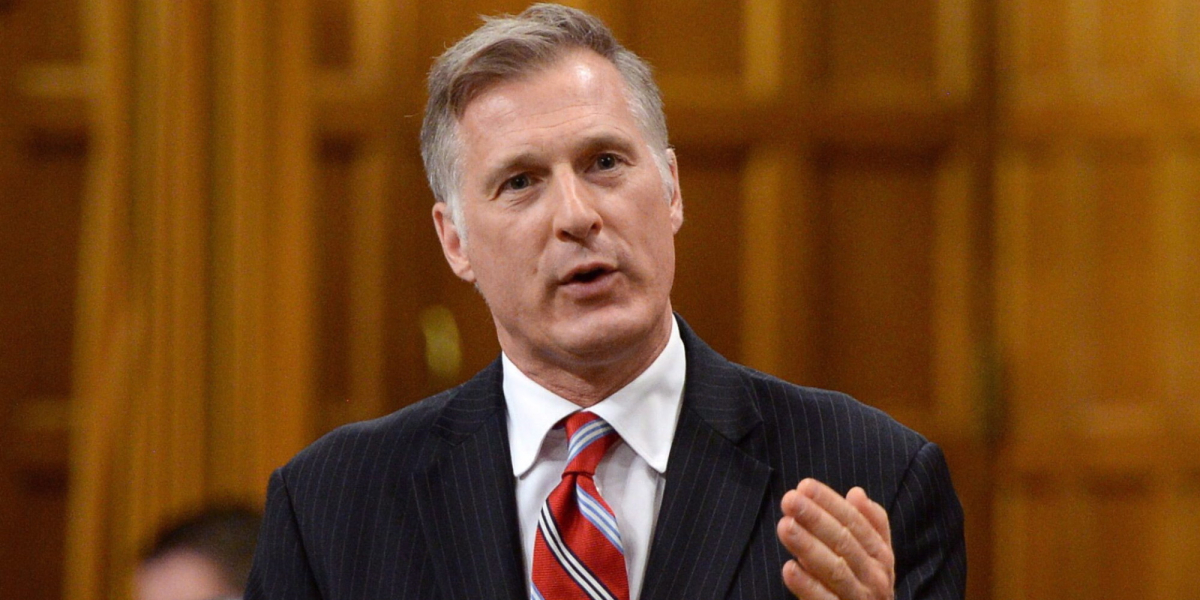

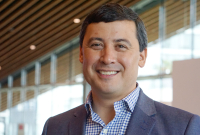
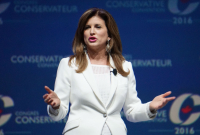
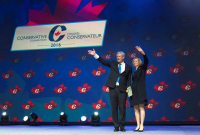
Comments